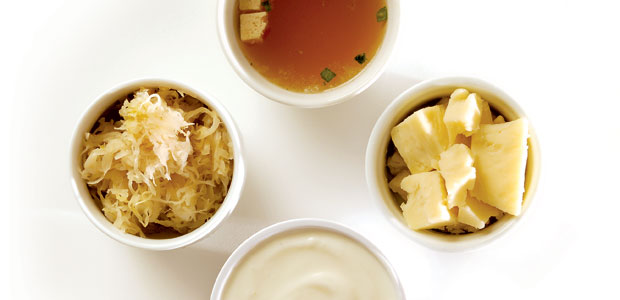Advertisement
Gut Reaction
Manage inflammatory bowel disease

Probiotics can have a beneficial effect on a wide range of inflammatory bowel disorders such as celiac disease, Crohn’s disease, and ulcerative colitis. They help to restore a healthy bacterial balance that not only supports the digestion process but also reduces inflammation in the intestine.
In ulcerative colitis, part or all of the lining of the large intestine may be swollen or inflamed. In Crohn’s disease, inflammation can occur in any part of the gastrointestinal tract, but it most commonly affects the lower part of the small intestine. In celiac disease, the villi in the small intestine are inflamed to the point that they cannot absorb nutrients.
Most cases of celiac disease, ulcerative colitis, and Crohn’s disease are controlled using anti-inflammatory drugs, specifically balsalazide or mesalazine. These medications are effective but may cause a variety of adverse effects, the most commonly reported being abdominal pain, headache, and diarrhea.
The Goal is Remission
The normal progression of ulcerative colitis and Crohn’s disease involves periods of remission and exacerbation. The goal is to induce remission while the disease is active, and maintain remission for as long as possible. Probiotics have been shown to effectively induce remission of ulcerative colitis and Crohn’s disease.
Once remission has been achieved, probiotics have been shown to effectively keep individuals in remission for longer periods of time. Probiotics also have been shown to be as effective as mesalazine in maintaining remission. Using medications in association with probiotics has been shown to work better than using the medications alone.
A broad range of dosages of supplemental probiotics have been used in human studies. Follow label directions or consult with a naturopathic physician to determine the most appropriate dosage of probiotics for you.
Find Them in Food
Probiotics can be taken as supplements, but they are also found in food sources. Traditional foods from many different cultures use live bacterial cultures to make fermented foods that are considered to have health benefits. Some of these foods made with live bacterial culture include cheese, yogourt, kefir, sauerkraut, tempeh, and miso. The ancient Greeks, Romans, and Egyptians also used chicory, a prebiotic ingredient that serves as a fuel source for probiotics.
Increased potency and absorption have been found with encapsulations of healthy bacteria that are designed to be released at a specific pH. They may enhance the therapeutic benefits of common fermented food sources.
Probiotics can effectively improve your overall health by supporting your digestive system. Probiotics have been studied in hundreds of human clinical trials and have been shown to be a safe and effective treatment for various inflammatory bowel conditions.
A Few Definitions
Probiotics should not be confused with prebiotics. The latter are complex sugars (such as inulin and lactulose, a variety of fructo-oligosaccharides called lactitol) that probiotics use as a fuel source; often probiotic supplements include prebiotic agents.
Rx Probiotics
Human clinical studies have shown that supplementation with probiotics is helpful in the management of a wide array of other medical conditions, including:
- antibiotic-associated diarrhea
- H. pylori infection
- gastric ulcer
- irritable bowel syndrome
- constipation
- asthma and rhinitis
- eczema
- bacterial vaginosis
- urinary tract infections
- pancreatitis
- seasonal allergies
- cystic fibrosis
The effectiveness of probiotic supplementation in these conditions and others has been studied in more than 450 articles published in scientific journals all over the world.




